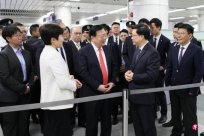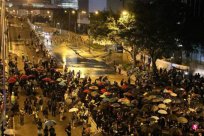The Hong Kong Legislative Council passed Article 23 of the Basic Law on Tuesday (March 19). The relevant regulations took effect on the 23rd, which attracted widespread attention from the international community.Among them, the Australian government updated the tourism warning of Hong Kong on Friday, which mentioned that the severe laws in Hong Kong can be widely explained that people may inadvertently touch the law and be detained and refused to meet with lawyers without being prosecuted. Therefore, the level of risk will beMaintain the second level of "maintaining high alert" in level 4.
Cai Mingyan, the director of Taiwan National Security, reminds the public that if you want to enter Hong Kong, you must pay special attention to your personal safety and whether there is a political and economic situation that criticized mainland China in the past.
As for the political community of the United States and the United States, there is a call for government sanctions to sanctify Hong Kong government officials, but the British and American government temporarily take a wait -and -see attitude.The US State Department did not respond to whether the policy would change the Hong Kong policy after the next 23 legislation, but there was any room for saying that if the situation was required, other actions would be taken.
The British media quoted internal documents of the government that the British government had decided to "unlimited time -consuming" considering sanctioning Chinese officials last November last November.British officials were initially unwilling to comment on related reports in front of them. Later, another official clarified that the British government had never ruled out sanctions on anyone or individuals.
The Hong Kong South China Morning Post quoted a number of institutions, including Hong Kong's heavyweight political and business people, pointed out that although they were not locked by the United States as a sanctions target, they were cautious.A source of members of the CPPCC National Committee of China said that in the next few months, it will avoid going to the United States in this "most sensitive period", so as not to be inquired and "find trouble" by the US official for a long time.
It is reported that some people have recently met with the former Hong Kong Chief Executive Lin Zheng Yue'e, who was being sanctioned by the United States, and confirmed that she still needs to use cash as a daily expenditure.After being sanctioned by Lin Zhengyue, he revealed that he could not use credit cards and some financial services.
Another source revealed that the chairman of the Legislative Council Liang Junyan and 15 members of the bill committee responsible for reviewing the bill have been prepared for sanctions.After hearing the legal opinions, they had made arrangements for their assets.
According to the Hong Kong Executive Council and the Legislative Council's interest application form, among the Director of the Law Department Lin Dingguo, Liang Junyan, and 15 law members of the bill, Lin Jianfeng, a member of the Legislative Council member of the Communist Party, owns the most land and property.Six declarations.In addition, Liang Junyan has a property in the UK, Chen Shaoxiong has a property in Australia, and Huang Yinghao has a property in the UK and Canada.
Chen Weiqiang, a lecturer Chen Weiqiang, a lecturer in Hong Kong University of Science and Technology, pointed out in the United Morning Post that in recent years, the anti -China forces in American politics have been strong. Washington has previously sanned Lin Zhengyue and several officials.It is a member of the Legislative Council.However, the British has recently underworld and needs to strengthen economic and trade cooperation with China. It is likely that it will only protest in words, and the probability of adopting sanctions is not high.
Chen Weiqiang believes that the game between China and the United States may be heated further in the future. Political figures in Hong Kong's public office need to consider cutting with the United States, including the sale of assets in the United States and applying for their families in the United States to work or live in the United States.



